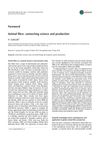 30 citations,
January 2023 in “EFSA journal”
30 citations,
January 2023 in “EFSA journal” Adults should not consume more than 255 micrograms of selenium per day to avoid risk of hair loss and other side effects.
 77 citations,
March 2014 in “Cold Spring Harbor Perspectives in Medicine”
77 citations,
March 2014 in “Cold Spring Harbor Perspectives in Medicine” Fat cells are important for healthy skin, hair growth, and healing, and changes in these cells can affect skin conditions and aging.
 1 citations,
November 2018 in “Elsevier eBooks”
1 citations,
November 2018 in “Elsevier eBooks” The document concludes that transplantology has evolved with improved techniques and materials, making transplants more successful and expanding the types of transplants possible.
 119 citations,
January 2012 in “Nutrition & Metabolism”
119 citations,
January 2012 in “Nutrition & Metabolism” Modern lifestyles, including poor diet, stress, and long-term use of certain medications, hinder the body's ability to heal from inflammation, leading to chronic diseases.
 3 citations,
January 2001 in “Cambridge University Press eBooks”
3 citations,
January 2001 in “Cambridge University Press eBooks” Finasteride effectively treats hair loss and enlarged prostate in men, with mild side effects.

Plant roots respond to fungus smells by possibly using certain proteins and a plant hormone to change root growth, but more research is needed.
9 citations,
July 2021 in “Frontiers in genetics” Melatonin makes cashmere grow earlier and more by increasing certain gene activity in goats.
 12 citations,
January 2020 in “Analyst”
12 citations,
January 2020 in “Analyst” Researchers found markers that can tell if hair has been bleached, which could improve hair test accuracy.
 August 2024 in “Drug Design Development and Therapy”
August 2024 in “Drug Design Development and Therapy” Decursin shows promise for treating cancer, neuroprotection, inflammation, and hair loss.
 18 citations,
March 2009 in “Medical Hypotheses”
18 citations,
March 2009 in “Medical Hypotheses” The document suggests that blocking sweat glands with antiperspirants might allow skin-generated hormones to be absorbed, possibly increasing breast and prostate cancer risk.
 January 2023 in “Discovery immunology”
January 2023 in “Discovery immunology” T cells and bacteria in the gut and skin help maintain health and protect against disease.
 November 2023 in “Frontiers in veterinary science”
November 2023 in “Frontiers in veterinary science” The study provides insights into hair growth mechanisms in yaks.
 April 2024 in “Frontiers in pharmacology”
April 2024 in “Frontiers in pharmacology” Cynoglossum amabile has medicinal potential but poses safety concerns due to liver toxicity.
 22 citations,
June 2012 in “PLOS ONE”
22 citations,
June 2012 in “PLOS ONE” Cholesterol-related compounds can stop hair growth and cause inflammation in a type of scarring hair loss.
 6 citations,
February 2023 in “Biomaterials Research”
6 citations,
February 2023 in “Biomaterials Research” Special gels help heal diabetic foot sores and reduce the risk of amputation or death.
 5 citations,
October 2022 in “Cosmetics”
5 citations,
October 2022 in “Cosmetics” Cell-based models help test if cosmetic ingredients really work for hair growth and skin health.
 August 2023 in “Natural Resources for Human Health”
August 2023 in “Natural Resources for Human Health” Vegetarians should take B vitamin supplements to avoid health issues.
 17 citations,
November 2014 in “American Journal of Physiology-gastrointestinal and Liver Physiology”
17 citations,
November 2014 in “American Journal of Physiology-gastrointestinal and Liver Physiology” Finasteride helps brain function in rats with liver-related brain issues.
 4 citations,
January 2010 in “Animal”
4 citations,
January 2010 in “Animal” Improving knowledge and practices in animal fibre production is crucial to meet market demands and potentially revive natural fibres.
 26 citations,
April 2019 in “Genes”
26 citations,
April 2019 in “Genes” lncRNA XLOC_008679 and gene KRT35 affect cashmere fineness in goats.
 May 2024 in “BMC veterinary research”
May 2024 in “BMC veterinary research” Metabolites and diet affect hair growth cycles in cashmere goats.
38 citations,
November 2020 in “International journal of biochemistry & cell biology” Keratin proteins are essential for keeping the cells in the human colon healthy and stable.
 3 citations,
January 2012 in “Wageningen Academic Publishers eBooks”
3 citations,
January 2012 in “Wageningen Academic Publishers eBooks” Hair health depends on various factors and hair loss can significantly affect a person's well-being; understanding hair biology is key for creating effective hair care treatments.
 1 citations,
November 2015 in “Indian Journal of Clinical Biochemistry”
1 citations,
November 2015 in “Indian Journal of Clinical Biochemistry” The conference presented findings on how vitamin D levels, genetic factors, and lifestyle choices like smoking and yoga affect various health conditions and diseases.
 9 citations,
October 2011 in “Journal of proteomics”
9 citations,
October 2011 in “Journal of proteomics” Taxol damages hair growth cells, causing hair loss.
 17 citations,
May 2021 in “Journal of Assisted Reproduction and Genetics”
17 citations,
May 2021 in “Journal of Assisted Reproduction and Genetics” COVID-19 may harm male fertility and damage the reproductive system.
 54 citations,
July 2002 in “Clinical and Experimental Dermatology”
54 citations,
July 2002 in “Clinical and Experimental Dermatology” DHT, a testosterone byproduct, causes male pattern baldness.
 32 citations,
April 1999 in “Expert Opinion on Investigational Drugs”
32 citations,
April 1999 in “Expert Opinion on Investigational Drugs” Finasteride effectively treats male hair loss, improving growth and density.
 103 citations,
June 2007 in “Endocrinology and Metabolism Clinics of North America”
103 citations,
June 2007 in “Endocrinology and Metabolism Clinics of North America” Male pattern hair loss is genetic and influenced by hormones, with treatments like minoxidil and surgery available.
 June 2001 in “International Journal of Cosmetic Surgery and Aesthetic Dermatology”
June 2001 in “International Journal of Cosmetic Surgery and Aesthetic Dermatology” Finasteride improves hair growth in men with androgenetic alopecia.




























